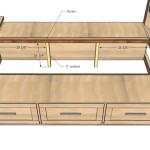Are Steel Garden Beds Safe?
Steel garden beds have become increasingly popular due to their durability and aesthetic appeal. However, concerns regarding their safety for plants and humans are often raised. This article examines the potential risks associated with steel garden beds, focusing on the impact of material composition, coatings, and environmental factors.
One primary concern involves the potential for chemicals to leach from the steel into the soil, impacting plant health and potentially entering the food chain. This leaching can occur through corrosion, a natural process where the metal reacts with its environment. The primary component of concern is iron oxide, commonly known as rust. While iron is an essential micronutrient for plants, excessive amounts can be detrimental, leading to toxicity and hindering growth.
Another potential concern relates to the composition of the steel itself. Some steel alloys contain trace amounts of heavy metals such as lead, cadmium, and chromium. While these are typically present in very low concentrations, the long-term implications of their accumulation in the soil require consideration. The risk of leaching these heavy metals depends on several factors, including the specific steel alloy, the pH of the soil, and the presence of organic matter.
Galvanized steel, a common choice for garden beds, is coated with a layer of zinc to prevent rust. While this coating offers protection, the potential for zinc to leach into the soil exists, particularly in acidic environments. Zinc, although a micronutrient, can also become toxic to plants at high concentrations. Over time, the zinc coating can degrade, exposing the underlying steel to the elements and increasing the risk of rust formation.
Powder-coated steel offers an alternative to galvanization. This process involves applying a dry powder coating to the steel and then curing it under heat, creating a durable, protective layer. Powder coating is available in a wide variety of colors and finishes, enhancing the aesthetic appeal of the garden bed. However, the safety of powder-coated steel depends on the specific composition of the powder coating. Some formulations may contain potentially harmful chemicals that could leach into the soil.
Corten steel, also known as weathering steel, is designed to develop a protective rust layer. This rust layer acts as a barrier against further corrosion, reducing the potential for leaching. While the initial rust formation may release some iron into the soil, this process stabilizes over time. Corten steel is often chosen for its distinctive rusted appearance, which adds a unique aesthetic element to garden designs.
The soil pH plays a crucial role in the potential for leaching from steel garden beds. Acidic soils (pH below 7) are more corrosive and can accelerate the leaching of metals like zinc and iron. Alkaline soils (pH above 7), on the other hand, tend to inhibit leaching. Regular soil testing can help determine the pH level and guide appropriate amendments to maintain a healthy soil environment.
The presence of organic matter in the soil can also influence the leaching process. Organic matter can bind to metal ions, reducing their availability to plants. Furthermore, it can buffer the soil pH, making it less acidic and therefore less corrosive. Incorporating compost, manure, or other organic materials can improve soil health and mitigate the potential risks associated with steel garden beds.
Environmental factors such as rainfall and humidity can also affect the corrosion rate of steel. High rainfall and humidity can accelerate the rusting process, particularly in areas with high salt content in the air. Choosing a suitable location for the garden bed, considering factors such as sun exposure and drainage, can help minimize the impact of these environmental factors.
Regular maintenance of steel garden beds is essential to ensure their longevity and safety. Inspecting the beds for signs of rust or damage is crucial. Applying a non-toxic sealant to the interior surfaces can provide an additional barrier against corrosion and leaching. Proper maintenance can significantly extend the lifespan of the garden bed and minimize potential risks.
Selecting the right type of steel for a garden bed involves carefully weighing the benefits and drawbacks of each option. Understanding the specific composition of the steel, its protective coating, and the potential for leaching is essential for making an informed decision. Considering the soil characteristics and environmental factors further assists in choosing the most appropriate material for a safe and productive garden.
Ultimately, with careful consideration of material selection, soil management, and ongoing maintenance, steel garden beds can provide a durable and aesthetically pleasing option for cultivating a variety of plants.

5 Misconceptions Of Metal Garden Beds Why They Are Safe Sunnydaze Decor

Are Galvanized Steel Garden Beds Safe Epic Gardening

Is It Safe To Use Galvanized Metal For Raised Beds Crate And Basket

Is It Safe To Use Vegega Metal Raised Garden Beds Bed

Are Metal Raised Beds Safe For Vegetables

Choosing The Best Materials For Raised Garden Beds Homestead And Chill

Is Galvanized Steel Safe For Garden Beds All You Need To Know

Bentism Galvanized Raised Garden Bed 8x4x1 Ft Metal Beds For Gardening Planter Box Vegetables Flowers With Safe Edging Gloves And Planting Tools Dark Grey Com

Outdoor Metal Raised Garden Bed 8x4x2ft Planter Box For Vegetables Flowers Herbs W 478 Gallon Capacity Black Com
Related Posts







